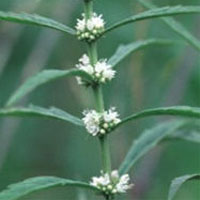Bugleweed
Uses
Parts Used & Where Grown
The leaves and flowers of this plant from the mint family are used medicinally. Both bugleweed and its European cousin, gypsywort (Lycopus europaeus), grow in very wet areas.
Traditional Use (May Not Be Supported by Scientific Studies)
The modern applications of bugleweed, unlike many medicinal plants, do not match its traditional use. Historically, bugleweed and related species were used to treat coughs and as a sedative.1 Today, the main use of this herb is for treating mild hyperthyroidism.
How It Works
Lithospermic acid and other organic acids are believed to be responsible for bugleweed’s activity. These acids decrease levels of several hormones in the body, particularly thyroid-stimulating hormones2 and the thyroid hormone thyroxine (T4).3 Bugleweed inhibits the binding of antibodies to the thyroid gland.4 These antibodies can cause the most common form of hyperthyroidism, Graves’ disease. All these actions may help explain bugleweed’s benefit in people with mildly overactive thyroids.
How to Use It
The German Commission E monograph recommends 1–2 grams of the whole herb per day.5 Intake of tincture should be limited to 1–2 ml three times a day. Bugleweed is often combined with other herbs used to treat mildly overactive thyroid function, including lemon balm(Melissa officinalis) and gromwell (Lithospermum ruderale).
Interactions with Supplements, Foods, & Other Compounds
Interactions with Medicines
Certain medicines interact with this supplement.
Replenish Depleted Nutrients
none
Reduce Side Effects
none
Support Medicine
none
Reduces Effectiveness
none
Potential Negative Interaction
- Dessicated Thyroid
(Lycopus virginicus, Lycopus europaeus) and lemon balm(Melissa officinalis) may interfere with the action of thyroid hormones. Check with your doctor before taking these herbs with thyroid hormones.
- Levothyroxine
(Lycopus virginicus, Lycopus europaeus) and lemon balm(Melissa officinalis) may interfere with the action of thyroid hormones. Check with your doctor before taking these herbs with thyroid hormones.
- Liothyronine
(Lycopus virginicus, Lycopus europaeus) and lemon balm(Melissa officinalis) may interfere with the action of thyroid hormones. Check with your doctor before taking these herbs with thyroid hormones.
- Liotrix
(Lycopus virginicus, Lycopus europaeus) and lemon balm(Melissa officinalis) may interfere with the action of thyroid hormones. Check with your doctor before taking these herbs with thyroid hormones.
Explanation Required
none
Side Effects
Excessive intake of bugleweed by people with thyroid disease or use by healthy people may cause a potentially harmful decrease in thyroid function. Thyroid disease is dangerous and should only be treated under the supervision of a healthcare professional. However, long-term use of bugleweed is considered safe for people with hyperthyroidism.6 Bugleweed should not be taken by people with hypothyroidism. Bugleweed should also not be used during pregnancy and breast-feeding.7
1. Wren RC, Williamson EM, Evans FJ. Potter's New Cyclopaedia of Botanical Drugs and Preparations. Essex, UK: Saffron Walden, 1988, 47-8.
2. Wagner H, Horhammer L, Frank U. Lithospermic acid, the antihormonally active principle of Lycopus europaeus L. and Symphytum officinale L. Arzneim Forsch 1970;20:705-12.
3. Winterhoff H, Gumbinger HG, Vahlensieck U, et al. Ednocrine effects of Lycopus europaeus L. following oral application. Arzneimittlforschung 1994;44:41-5.
4. Auf'mkolk M, Ingbar JC, Kubota K, et al. Extracts and auto-oxidized constituents of certain plants inhibit the receptor-binding and the biological activity of Graves' immunoglobulins. Endocrinol 1985;116:1687-93.
5. Blumenthal M, Busse WR, Goldberg A, et al. (eds). The Complete Commission E Monographs: Therapeutic Guide to Herbal Medicines. Boston, MA: Integrative Medicine Communications, 1998, 98-9.
6. Weiss RF. Herbal Medicine. Beaconsfield, UK: Beaconsfield Publishers Ltd., 1988, 328-9.
7. Brinker F. Inhibition of endocrine function by botanical agents. I. Boraginaceae and Labiatae. J Naturopathic Med 1990;1:10-8.
Last Review: 03-24-2015

Copyright © 2024 TraceGains, Inc. All rights reserved.
Learn more about TraceGains, the company.
The information presented by TraceGains is for informational purposes only. It is based on scientific studies (human, animal, or in vitro), clinical experience, or traditional usage as cited in each article. The results reported may not necessarily occur in all individuals. For many of the conditions discussed, treatment with prescription or over the counter medication is also available. Consult your doctor, practitioner, and/or pharmacist for any health problem and before using any supplements or before making any changes in prescribed medications. Information expires December 2024.
This information does not replace the advice of a doctor. Ignite Healthwise, LLC, disclaims any warranty or liability for your use of this information. Your use of this information means that you agree to the Terms of Use. Learn how we develop our content.

